What are the best sweeteners for the keto diet? Check out this comprehensive guide to baking with sugar substitutes, and learn how to get the taste and texture you crave!
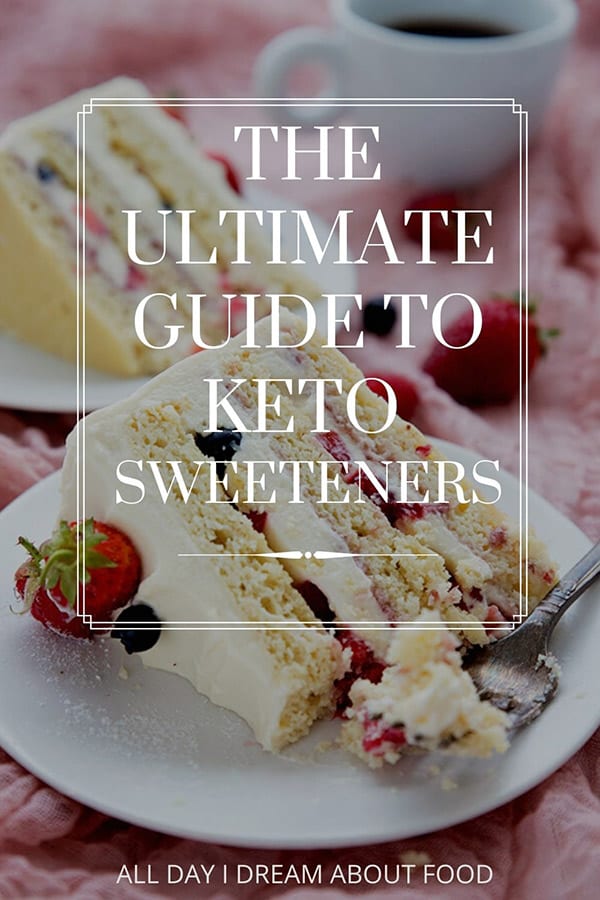
Today, my keto friends, I am imparting some of my vital knowledge and deep wisdom about using keto sweeteners. We will discuss all of their pros and cons, and how they affect the outcome of your keto desserts.
In advance of the holiday baking season, I figured you could put this information to good use. Because if you’re anything like me, you like to get an early jump on your keto holiday cookies!
This is actually an abridged version of the in-depth keto sweetener section in my book, The Ultimate Guide to Keto Baking. I think you will find it very informative.

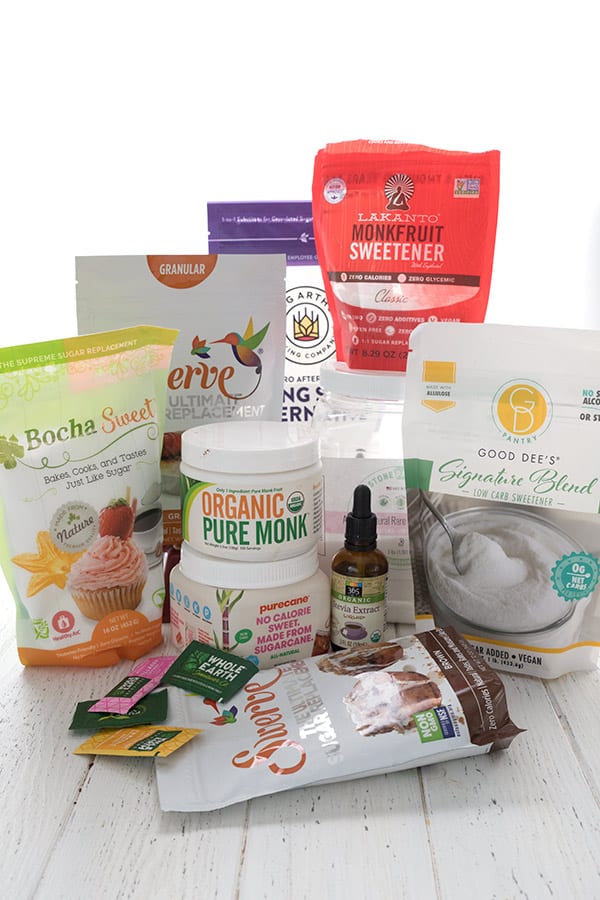
What is the best keto sweetener?
I’m sorry, I simply cannot answer that for you.
I’m not being willful or stubborn, or deliberately withholding information. It’s simply that there is no such thing. Yes, you read that right – there is no such thing as the best keto sweetener.
Here’s why: Everyone experiences these sugar substitutes differently. It’s almost as individual as the individual themselves.
- Some people experience an unpleasant aftertaste with one and not another.
- Some people suffer from GI issues or headaches when consuming certain sweeteners.
- Some people see a blood sugar rise when other people do not.
- Some people may even experience an allergic reaction to certain sweeteners.
With the sugar substitutes market constantly expanding and changing, it’s much more about finding what sweeteners work best FOR YOU.
What are the best sweeteners for keto baking?
Ah, now we’re on to something. This is my territory and one that I have researched extensively. I have experimented with a wide array of sugar substitutes and I can tell you straight up that none of them behaves exactly like sugar.
They all have very different properties and the sweetener(s) you choose will impact the outcome of your recipes. The trick is to understand their different attributes and use them to advantage.
Consider the final product before choosing your sugar substitutes. What are you trying to make? What consistency are you trying to achieve? Do you want it crisp or soft? Chewy or cakey? Should it be gooey or firm?
Most of the popular brands on the market are actually blends of two or more keto sweeteners. For simplicity’s sake, I am going to break them down into their main ingredients.
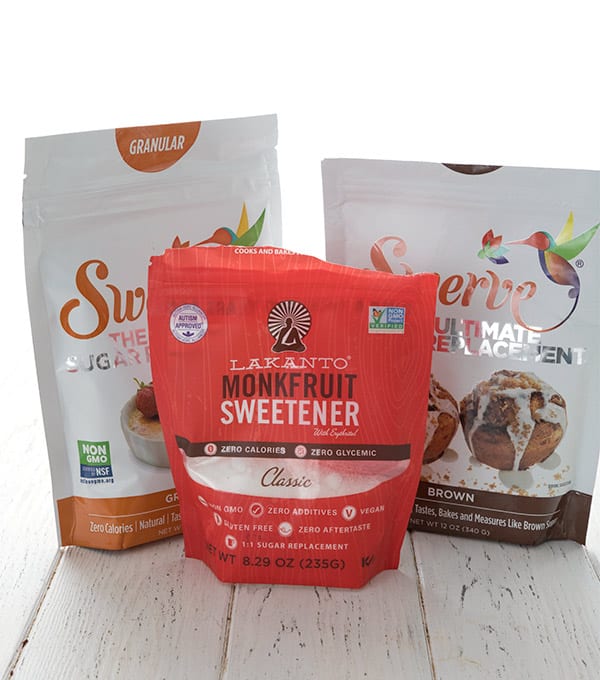
Erythritol
What is it?
Erythritol is a sugar alcohol (polyol) that is naturally present in some fruits and fermented foods. For mass production, it is made by fermenting a glucose syrup with enzymes.
It is unique among sugar alcohols in that it has zero carb impact. Our bodies simply do not recognize it as a carb so it does not impact blood sugar at all. And unlike many sugar alcohols, it does not cause gastrointestinal issues for most people.
How does it work?
Similar to sugar:
– Erythritol mimics sugar in its crystalline structure, so it helps whip air into butter and egg whites.
– It also browns and crisps up nicely and it can even be coaxed into caramelizing.
Differs from sugar:
– It’s only 70% as sweet as sugar, which is why most brands combine it with other sweeteners, to make it measure cup for cup.
– It’s non-hygroscopic, meaning that unlike sugar, it does not attract or hold onto moisture, which can cause baked goods to be dry and crumbly if they don’t have enough fat.
– It can re-crystallize as it cools, particularly in liquid applications like sauces, custards, and ice cream.
– Some people experience a mouth-cooling sensation, similar to sucking on a mint. Not everyone experiences this, and often mixing it with other sweeteners eliminates this sensation.
Major Brand Names: Swerve, Lakanto (this is mostly erythritol… do not be fooled by the fact that it calls itself a “monk fruit sweetener”), So Nourished, ZSweet.

Xylitol
What is it?
Xylitol is also a sugar alcohol found in some fruits and vegetables, as well as in wood and corn. It is usually manufactured commercially from corn or birch trees.
Some, but not all, xylitol is absorbed by the intestines into the bloodstream. This means it can cause some gastrointestinal discomfort when consumed in large amounts. It can also have an impact on blood sugar.
WARNING! The biggest issue with xylitol is that it is highly toxic to dogs.
How does it work?
Similar to sugar:
– It has a crystalline structure so it can whip air bubbles into butter and egg whites. It’s also as sweet as sugar.
– It’s more hygroscopic than erythritol so it attracts moisture and it doesn’t re-crystallize as it cools. Xylitol is great for ice creams and sauces to keep them soft.
Differs from sugar:
– Xylitol doesn’t caramelize or crisp up very well. This can cause problems for baked goods that need a crisp texture, like many keto cookies. They will turn out much more cakey and soft if you use xylitol.
– Definitely do NOT use for meringue, as it will stay gooey and soft, and won’t come off the parchment paper.
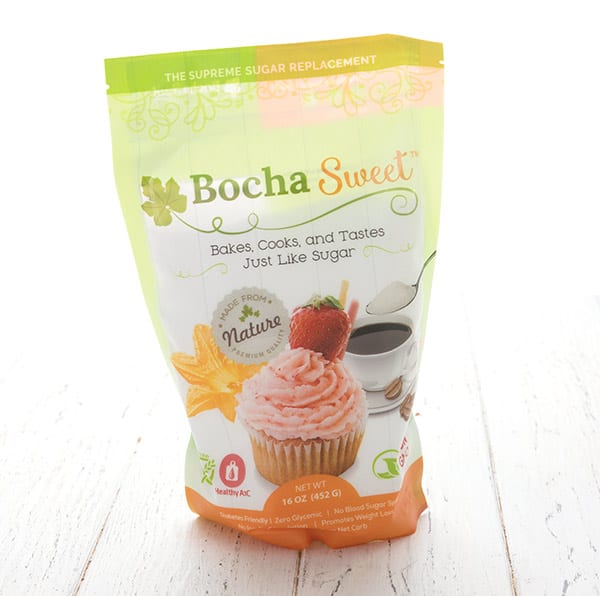
BochaSweet
What is it?
BochaSweet is the brand name of a unique sweetener derived from the kabocha squash, a type of winter squash also know as Japanese pumpkin.
Like erythritol, it seems to have little to no impact on most people’s blood sugar. But like xylitol, it can cause some gastrointestinal upset when consumed in large quantities.
In many ways, BochaSweet functions a lot like xylitol (they are both pentose sweeteners), but it does not appear to be toxic to household pets.
How does it work?
Similar to sugar:
– BochaSweet is as sweet as sugar and so can be used as a cup-for-cup replacement, without an apparent aftertaste.
– It is more hygroscopic and doesn’t re-crystallize so it’s great in sauces, custards, and ice creams. (I have started using it in combination with Swerve in all of my keto ice cream… they stay scoopable even straight from the freezer!).
Differs from sugar:
– Just like xylitol, BochaSweet will not crisp up or brown very well. Cookies end up soft and cakey, and meringues are so gooey that they won’t come off the paper.
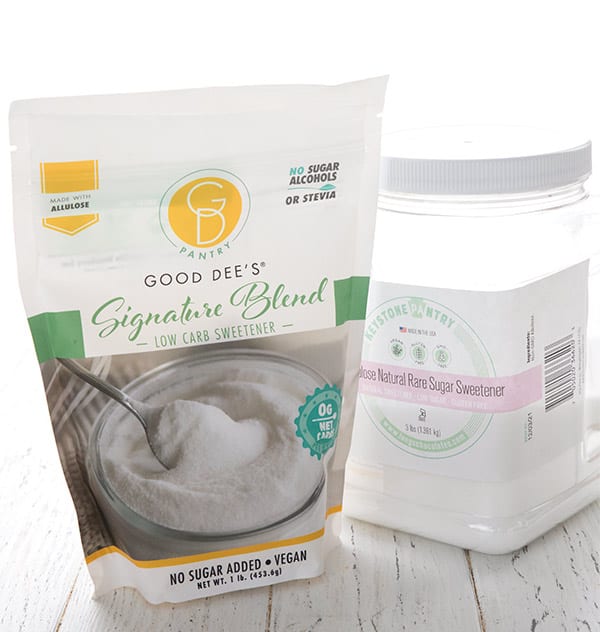
Allulose
What is it?
Allulose is a relative newcomer on the sugar alternative scene and has become incredibly popular. It is a monosaccharide, which means it really is a “sugar”, but one that our bodies don’t treat like a sugar or a carb. It is largely excreted without ever affecting blood glucose levels.
However, I caution you from personal experience that large amounts can cause serious GI distress. Many people don’t seem to suffer from this, but some of us do and it’s…not fun.
So it’s worth testing on yourself in small amounts and building up from there.
How does it work?
Similar to sugar:
– Allulose caramelizes nicely and tends to be hygroscopic, keeping sauces and ice creams soft, and baked goods tender.
Differs from sugar:
– Allulose is only 70% as sweet, which means you need more to sweeten your desserts.
– While it caramelizes well, it doesn’t crisp up well and baked goods tend to be soft and cakey. Even just a little allulose, in combination with other sweeteners, can prevent your cookies from becoming crisp.
– It can over-brown the outside of baked goods, especially the parts that are touching the sides of the pan. Cakes can have a dark, almost burnt appearance, although they aren’t over-cooked.
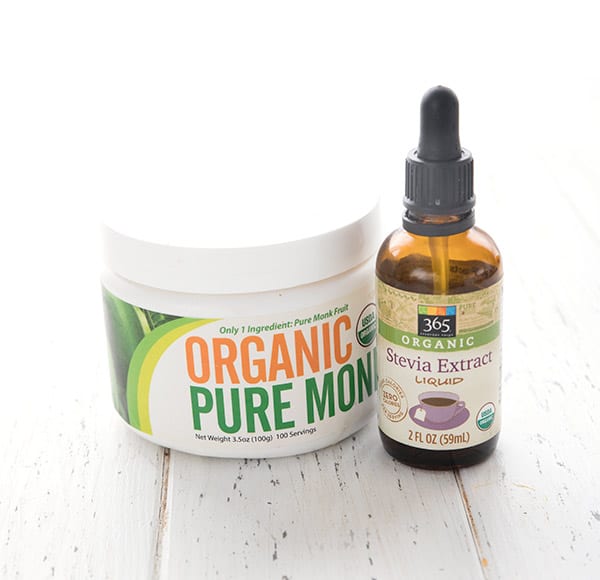
Stevia and Monk Fruit
I am lumping these two together because they have many similar properties and behave much the same way.
What are they?
Both stevia and monkfruit are naturally derived, plant-based sweeteners that are hundreds of times sweeter than sugar. Because they are extremely concentrated, a tiny amount can sweeten a whole recipe.
While that may sound like a good thing, it can have major implications for your keto baked goods. Read on…
How do they work?
Concentrated sweeteners like these have no “bulk” – they have little in the way of weight or volume so they don’t add much to your recipe other than sweetness. They can’t contribute anything to texture or consistency, and they don’t caramelize, crisp, or brown your baked goods.
Bulk is an important factor in anything from cupcakes to frosting. Substituting a non-bulk sweetener means your keto treats may not rise properly, may be more fragile, and may not set properly.
“Monk fruit sweetener”
Please be aware that many brands that bill themselves as “monk fruit sweetener” are actually mostly erythritol. The main ingredient is erythritol, with a little monk fruit to make it sweeter. This means that the sweetener will behave mostly like erythritol.
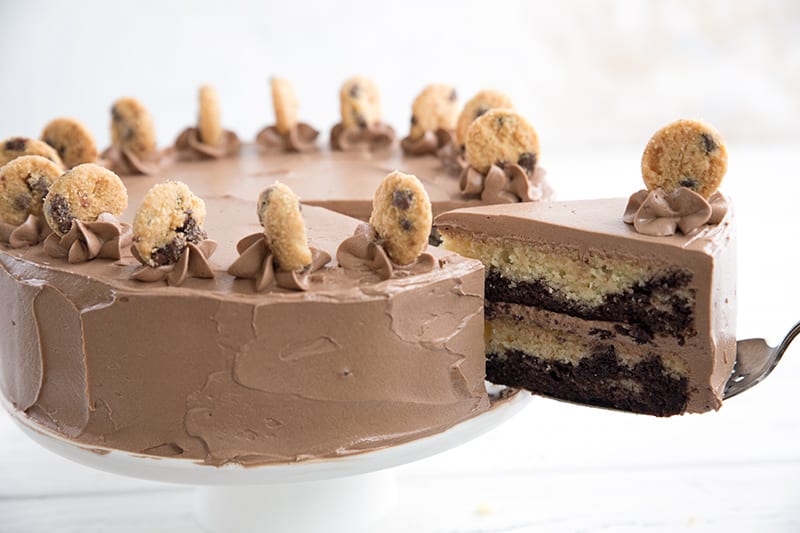
How to use sugar substitutes
I’ve thrown a ton of information at you and I know it’s hard to digest it all. I do this for a living and still I have times when a certain sweetener doesn’t behave the way I think it should. But here’s a quick cheat sheet on what to use when:
Want crisp keto cookies? Use erythritol based sweeteners like Swerve, Lakanto, or So Nourished. Other options will make your cookies soft and cakey. I highly recommend Swerve Brown for the best brown sugar substitute for cookies!
Making a keto cake recipe? Use any sweetener that has bulk (erythritol, BochaSweet, xylitol or allulose), but do be forewarned that some are not quite as sweet as sugar and you may need more of them.
Making a keto frosting? You need a bulk powdered sweetener to give your frosting structure. Erythritol, xylitol, and BochaSweet all have confectioners (powdered) versions. Allulose may as well but I am unsure of brands.
Want a gooey consistency? Try using BochaSweet or allulose, or combine it with another erythritol based sweetener. This combo is perfect for things like keto caramel sauce or my keto pecan pie.
Want keto ice cream that stays scoopable for days? My recommendation is half Swerve and half BochaSweet or allulose. Using only erythritol based sweeteners makes your ice cream rock hard, and all BochaSweet makes it too soft (it stays like soft serve!).
Just trying to sweeten your coffee? Use whatever you like best. They all work well if you don’t need a certain consistency so this is a matter of personal preference.
Still have questions?
Leave a comment and I will do my best to answer!
Adding to the confusion is that many brands on the market are blends of the keto sweeteners I outlined above. Blending sugar substitutes can maximize their sweetness and reduce potential aftertastes.
But I’ve tried such a wide array of sweeteners, I have a good idea of how most of them work. I can also take an educated guess based on the ingredients list. So drop me a line and I will give you all the information I can.

Free Bonus: Secrets to Keto Baking!
Sign up for your favorite recipes delivered straight to your inbox plus get our FREE bonus: Secrets to Keto Baking!

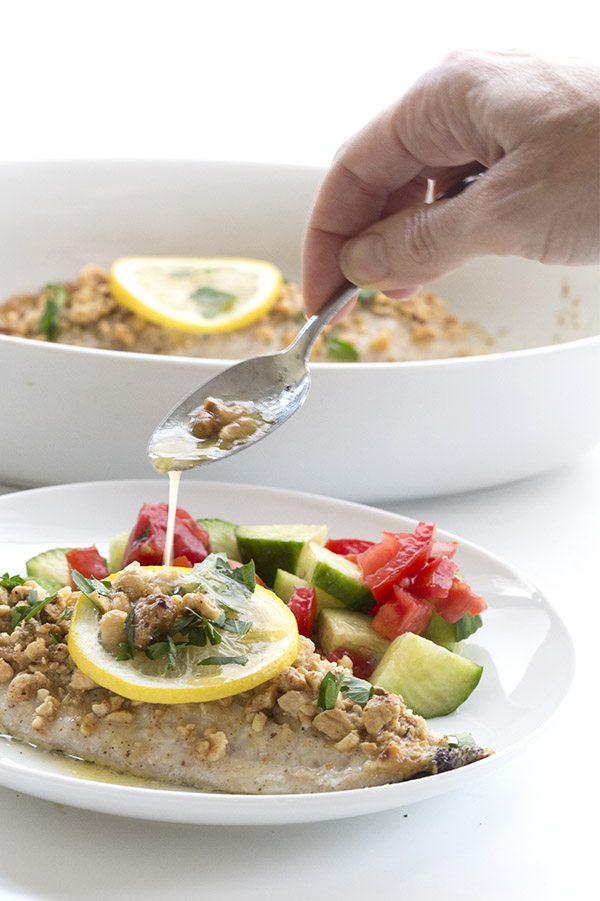
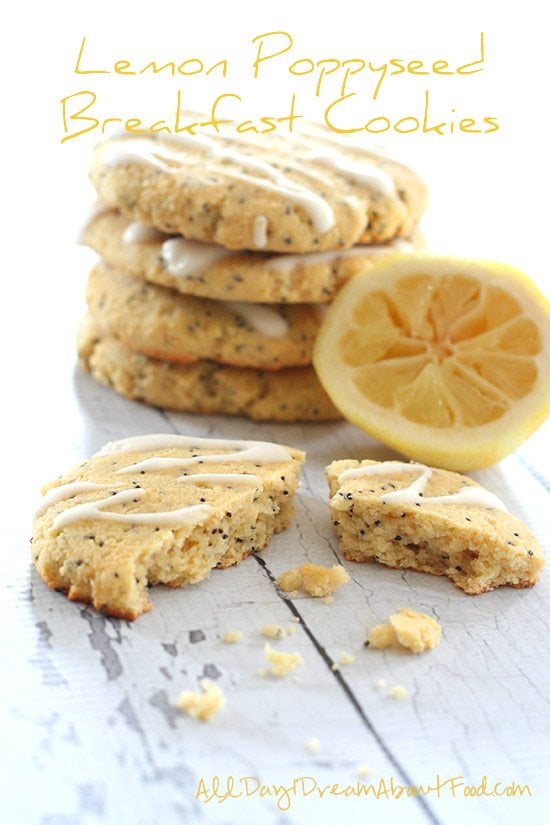

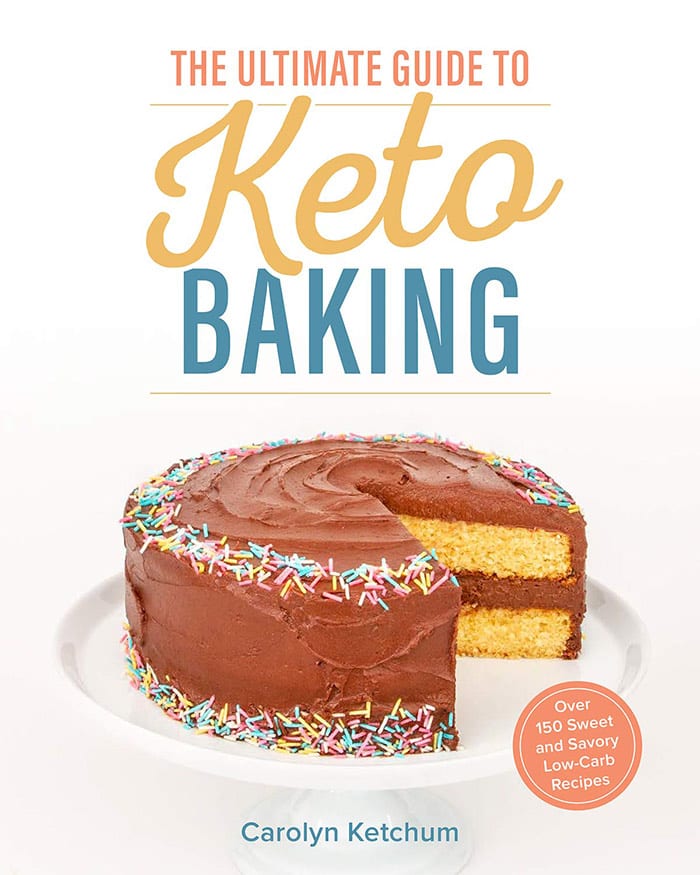










Hi Carolyn, Happily I discovered you a few months into my Keto journey and I am so grateful for all the useful info you provide along with your excellent recipes.
This article on sugar substitutes is very helpful. Many thanks.
One question: you mention a number of products that won’t work for meringues (which I unfortunately discovered first hand before reading this). Is there a sweetener you can recommend for this purpose?
Any erythritol sweetener that doesn’t contain ANY allulose or xylitol should work. Swerve is my choice!
Thanks for this awesome sweetener comparison. Very Helpful!! I am going to print it out so I can reference it often.
which brand of allulose do you recommend.
https://amzn.to/3XM3V4B
I was wondering if you have tried “PureCane” yet? I really like it especially for taste. It seems to be basically a 1:1 replacer at least for sweetness. I actually ‘asked” on their webpage about whether it is hygroscopic like sugar (since it’s actually made from sugar), but they didn’t give me a good answer. (I think the word “hygroscopic” threw them lol) It comes in all 3 forms: granulated, brown, and powdered. As far as I can tell at this point it’s only available from their webpage. like many others, it is erythritol based.
I tried it once and cookies and was underwhelmed. The cookies ended up very hard, like rock cakes!
I am learning ins/outs of Keto but was wondering–is there a real keto powdered sugar? It is hard to have to buy 7 different kind of sweetners instead of just sugar!
Thank you for all the recipes and the fact that they are easy to print and follow unlike many that you find online!
But when you bake with sugar… do you just have one kind? No… you have granular, powdered, and brown, at the very least. Sometimes you also have a few others. So it’s often the same thing with keto ingredients. This is your best bet for keto powdered sweetener: https://amzn.to/3YJsOP1
Hey Carolyn…
I have tried to use a couple different sweeteners in my pickle-making, and can’t find the right one that will make my pickles sweet and spicy….without a bad taste…whatever it is. Can you give me a good sub for sugar in my recipe? I make refrigerator pickles and also can some that don’t have sugar in them (garlic dill.) I just today received my first order for Allulose, and I already use sucralose, but haven’t tried it in the pickles. I hate to have to throw out yet another batch of pickles…Thanks alot, Pam
I haven’t tried it for pickles but allulose would be my choice.
Thanks for this article. Have you ever heard of a sweetener called WheyLow? They claim, even though it is made of sucrose, lactose and fructose, it doesn’t effect blood sugar in the same way when these three are combined and is absorbed in the intestines differently than sugar. I cannot find much third party information, only the info on their website. Still trying to determine if it raises my blood sugar. Sometimes I test and it seems to raise it a bit, other times it doesn’t. Thanks for your response.
Yes, I’ve heard of it. Never used it… not very commonly available.
Hi
Thanks for this info. I’ve just been reading about Isomalt – do you have any experience with this?
I do and it spikes my blood sugar so I don’t use it.
Are all the erythritol-based sweeteners interchangeable? I find it easier to get Lakanto than Swerve but your recipes often call for Swerve. If I am using one of your recipes that calls for Swerve but I use Lakanto instead would I expect just about the same result? Thanks
Lakanto is a good sub.
Hi Carolyn,
I just found your sweetener guide. Is this available in a printable chart form?
Thank you.
I tolerate liquid sucralose pretty well and was wanting to make a jam with it. You don’t mention sucralose in your article. Was there a reason you didn’t include it? If you have experience with it in a syrup or jam context can you share your thoughts on it?
I don’t include it because it is not a natural sweetener. Additionally, it adds no bulk to recipes and won’t contribute to the consistency.
In your sugar free marshmallow recipe what could be substituted for the Bocha sweet ?
Xylitol is your next best option.
Hi Carolyn,
Neither allulose nor Boca Sweet are available in Canada. I am in Burnaby, BC. I tried to pick some up the last time I traveled to Arizona but had no success. What do you recommend?
Thanks for all your wonderful recipes!
Lynda
Actually, they are. There are several online low carb stores in Canada that sell them.
Hi Carolyn thank you for all the info and your excellent recipes. I recently have come across some issues using Allulose or Allulose based sweeteners (eg with monk fruit) in frostings and whipped cream. I feel sometime the whipped cream is too soft and not stable enough to use as a frosting and stiff peaks won’t form (although I’m also adding xanthan gum to stabilize it). Do you know if that is due to the Allulose or perhaps the cream I am using (using heavy cream)? Have you had this issue?
It’s the allulose! That’s sort of the point in this post, that allulose makes things too soft and takes a long time to set in custard or ice cream too.
Hi Carolyn, I love all your recipes! When using bocha sweet instead of swerve would it measure the same?
Thanks!
what can be substituted for corn syrup? I don’t like the taste of stevia – would liquid allulose work? what about agave syrup? Thanks!
wondering about the new Splenda baking blends of erythitol, allulose and stevia….for things like your caramel sauce or marshmallows – would that one blend be enough and just add double or is the ratio not right for that?
Carolyn, I would like your opinion of King Arthur Baking Sugar Alternative. I am in love with their Keto Wheat Flour and am on their site looking at recipes for that flour. They say specifically “Using another sugar replacement or alternative, one with a different formulation, will yield different results. For best success, use the specific product called for: King Arthur Baking Sugar Alternative.” I have so many other sugar substitutes that I am not excited to add to that bunch unless you have found that what they say is true and to get the best results, I must use their sugar substitute. Do you have an opinion?
It’s largely erythritol but it has some allulose. Which means it won’t crisp up properly. In many recipes, Swerve will work but you will get more crispness (but also more recrystallization in some recipes).
Carolyn, you are truly amazing!!! Thank you for all your hard work, and recipes. You are a godsend!
Thank you so much for all of the research and time you put into your recipes! I truly appreciate it! Your website is my bible for all Keto baking now! I also recommend you to anyone who is new to Keto.
Question: What are your thoughts on Truvia? I have it in my pantry and would like to use it. Could it be used in place of Swerve in recipes?
It’s an erythritol based sweetener so it’s a good replacement for Swerve. I am not sure how they make it now, but it used to be 2x as sweet (so you’d only need 1/2 as much). Check the bag and see what it says about how sweet it is compared to sugar.